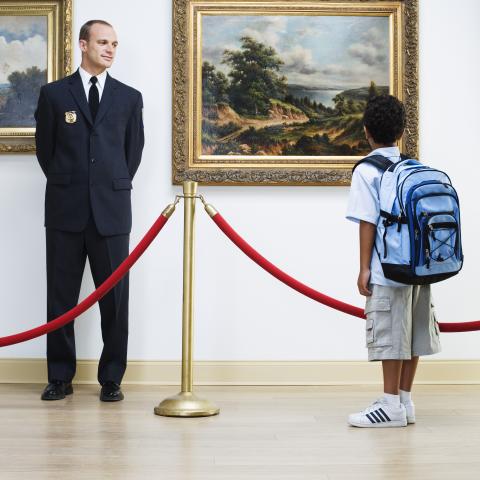So, why exactly should you learn Arabic customs and etiquette?
Imagine for a moment two foreigners coming to your place of work.
The first one speaks your native language flawlessly—but they’re a total jerk. It’s easy to communicate with them, but it’s just words. You have no evidence that your message is actually getting through to their behavior.
The second has a moderate to thick accent, and sometimes there are things you have to ask them to repeat. But they fit right in with the work culture, and every time you’re able to communicate, things work out exactly as you intended.
Which one do you prefer? Someone who knows your language, or someone who knows your culture?
Since you’re reading this article, it’s clear that you’re interested in languages to some extent. And that’s great! It makes a big difference to speak to someone in their native language.
But actually being polite in that language—fully understanding the different cultural norms that might apply—is a whole new level.
And so we’ve got a great guide right here for any Arabic learner who wants to give a boost to their knowledge of language and culture in the Middle East. By the end of this article, you should have a good grasp of all the Arabic customs and etiquette you should as a tourist or newcomer.
Table of Contents
- Arabic Greeting Etiquette
- Arab Business Etiquette
- Arabic Table Etiquette
- Arab Etiquette for Sightseeing
- Arab Etiquette When Visiting Others
- Arabic Customs and Etiquette for Public Transportation
- How ArabicPod101 Can Help You Master Arabic Etiquette
1. Arabic Greeting Etiquette
It literally all starts with greetings. If you don’t do what’s expected of you during the very first step, you’ll have a rough time recovering.
Fortunately, we have a whole separate article about greetings in Arabic.
For now, just one extra point:
If you’re seated when someone else enters the room, absolutely stand up. Your body language during a greeting is very important. Men should extend handshakes to other men, but don’t be surprised if they’re less firm than they would be in the West.
Very nice to meet you.
tašarraftu bimaʿrifatik
تَشَرَّفتُ بِمَعرِفَتِك
2. Arab Business Etiquette
Some of you are, in all likelihood, preparing to use your Arabic on a business trip. Whether that involves having meetings or wooing clients, you should know what to say and how to say it.
Although local dialects and customs are quite different across the Arab world, there are many things that remain consistent. One of the most important is the exchanging of business cards, which has a certain ritual to it.
Your card should have your full department title on it, with one side in Arabic and one in English. Present it with your right hand (or both hands), and say:
Here is my business card.
tafaḍḍal biṭāqaẗu ʾaʿmalī
تَفَضَّل بِطاقَةُ أَعمالي
There’s also a sort of double standard that can exist for foreign business visitors—and I’m not even talking about the tendency for Arabs to keep foreigners waiting.
During a meeting, you may start to get annoyed if your interlocutor is constantly checking his phone or speaking to other staff. But that’s normal in Arab business culture, and you shouldn’t hold it against them. What you also shouldn’t do is imitate that behavior. As a visitor, you’re expected to have your full attention on the meeting.
Please excuse me, I have to take this call.
aʾrǧū al-maʿḏirah, lābud ʾan ʾuǧrī haḏihi al-mukalamah
َأرجو المَعذِرَة, لابُد أَن أُجري هَذِهِ المُكالَمَة
It’s quite alright.
kullu šaīʾin ʿalā mā yurām
كُلُّ شَيءٍ عَلى ما يُرام
Be prepared for this sort of exchange to occur, and you’ll handle it excellently every time.
3. Arabic Table Etiquette
When it comes to Arabic etiquette, dining is based mostly around body language. For one thing, the feet are considered dirty at all times, so you shouldn’t cross your legs (thus pointing the sole of your foot toward somebody else).
For another, it’s considered bad manners to refuse food from somebody else, particularly if they’re hosting you or paying for the meal. Once you’re full, you’ll have to use a phrase like this to do it politely:
Thank you, but I absolutely can’t eat any more.
šukran, lakinnanī ḥaqqan lā aʾsatṭīʿu ʾan ʾākul ʾakṯar min haḏā.
شُكراً، لَكِنَّني حَقّاً لا َأسَتطيعُ أَن آكُل أَكثَر مِن هَذا.
Of course, you should also return the favor to others. When you offer food, be sure to use your right hand (or both hands), as the left hand is considered unclean.
Here, try some of this. It’s delicious!
hā hunā, ǧarrib baʿḍan min haḏā, ʾinnahu laḏīḏ!
ها هُنا, جَرِّب بَعضاً مِن هَذا, إنَّهُ لَذيذ!
4. Arab Etiquette for Sightseeing
With so many governments pouring money into tourism every year, it’s no secret that plenty of people are coming to the Middle East to simply see what it’s like.
One thing that Western visitors may struggle with is the etiquette around taking photos of mosques and Muslim worshippers. Entering a mosque may seem like a major event for a non-Muslim, but in many cases, it’s actually quite encouraged. No matter where you are, an educated and respectful visitor is a welcome guest indeed. Here’s what you should do.
Please take off your shoes.
ʾiḫlaʿ ḥiḏāʾaka min faḍlik
إخلَع حِذائَكَ مِن فَضلِك
Cleanliness is quite important in Islam, as we’ve seen, and as houses of worship, mosques are immaculate. If you don’t want to remove your shoes, stay outside.
May I take photos here?
hal yumkinunī al-taṣūīr hunā?
هَل يُمكِنُني التَصوير هُنا؟
Like churches in Europe, most mosques in the Middle East are perfectly okay with visitors taking photos. Be respectful as you do it, especially if you have a noisy camera. Some mosques will allow tripods, and some won’t—simply point to the tripod, if you have it, as you ask the question.
Unless you’ve specifically asked the individuals beforehand, don’t take photos of people praying or cleaning themselves. These are highly personal moments and aren’t done for performance.
When you’ve finished, it’s good etiquette in Arabic-speaking countries to extend a heartfelt thank you—and perhaps a compliment—as you leave.
Thank you very much. This place is beautiful.
šukran ǧazīlan. haḏā al-makān ǧamīl.
شُكراً جَزيلاً. هَذا المَكان جَميل.
Naturally, there are places to visit besides mosques. At museums, for instance, you’ll certainly want to ask the same questions about photos. And one other phrase I’ve found very helpful at a museum (or any interesting site) is this one:
Is it okay to touch this?
hal yumkinunī lams haḏā?
هَل يُمكِنُني لَمس هَذا؟
Although it can be an interesting experience to enjoy a museum without understanding a thing, this last phrase is probably something you’ll want to ask if your Arabic isn’t quite up to snuff.
Do you have any guides in English / in French?
hal ladaykum ʾayy muršidīn siyaḥiyyin billuġah al-ʾinǧlīziyyah / billuġah al-faransiyyah?
هَل لَدَيْكُم أَيّ مُرشِدين سِيَاحِيِّن بِاللُغَة الإنجليزِيَّة / بِاللُغَة الفَرَنسِيَّة؟
5. Arab Etiquette When Visiting Others
So remember when you visited the mosque and took your shoes off? Same deal here, except the stakes are a tiny bit higher; this is because at least big mosques have probably had clueless tourists visit before. When you see a rug (not if) you had better not let your shoes touch it.
You can, and should, bring a small gift, like honey, chocolates, nuts, or dried fruit. During Ramadan, dates are the typical gift to bring to others.
This is for you.
Tafaddal. haḏā lak.
تفضل. هَذا لَك.
Don’t be offended when the recipient rushes to put it away. It’s impolite in Arab cultures to open gifts in front of the sender. If you receive one, give them your sincere thanks:
How lovely! Thank you so much!
kam haḏā laṭīf! šukran ǧazīlan!
كَم هَذا لَطيف! شُكراً جَزيلاً!
While you’re being entertained, you should pay attention to your body language. The same things that signify “I’m having a bad time,” in the West—hands in pockets, slouching against chairs, general sullenness—are understood in the Arab world, but they’re taken much more personally as a sign of the host’s failure. Stay chipper and upbeat as best you can, and treat each interaction with respect.
When the evening is winding down and it’s time to hit the road, there’s one last moment for polite words:
I had an excellent time. Please do visit me someday!
alaqd ʾistamtaʿt biwaqtī hunā, min faḍlik qum biziīāratī yūman mā!
َلَقد إستَمتَعت بِوَقتي هُنا, مِن فَضلِك قُم بِزِيارَتي يَوْماً ما!
6. Arabic Customs and Etiquette for Public Transportation
Arab men will, without hesitation, offer their seats to women on public transportation, especially if the women are older. You should too!
Here, you can have my seat.
hā hunā, yumkinuki al-ǧulūs ʿalā miqʿadī.
ها هُنا, يُمكِنُكِ الجُلوس عَلى مِقعَدي.
If you’re not certain about whether you’re in the right place, you can ask the driver or someone around you. Remember, people you see every day on the street are unlikely to be able to reply to you in good MSA, so keep your ears open for similar words and pay attention to their body language.
Does this bus stop at…?
hal tatawaqqaf haḏihi al-ḥāfilah ʿinda …?
هَل تَتَوَقَّف هَذِهِ الحافِلَة عِندَ …؟
In the UAE and Dubai, there are some buses and metro trains with women-only sections. If you happen to be a man and miss the pink stickers and sit down anyway, you may hear:
Excuse me, you can’t sit there. That’s for women only.
ʿuḏran , lā yumkinuka al-ǧulūs hunāk. haḏā muḫaṣṣaṣ lilnisāʾ faqaṭ.
عُذراً ، لا يُمكِنُكَ الجُلوس هُناك. هَذا مُخَصَّص لِلنِساء فَقَط.
If you’re obviously very ill and there are no other seats, you may get a pass, but otherwise you’d better get up and respond:
I’m sorry, I didn’t see the sign.
ʾanā ʾāsif , lam ʾara al-ʿalāmah.
أَنا آسِف ، لَم أَرَ العَلامَة.
Pay attention to signs or announcements such as these:
It is forbidden to drink water on the train.
yumnaʿ šurb al-māʾ dāḫil al-qiṭār.
يُمنَع شُرب الماء داخِل القِطار
Don’t risk the fine!
7. How ArabicPod101 Can Help You Master Arabic Etiquette
If this sort of article makes you nervous about traveling to new places, don’t sweat it. Nobody’s going to jump on you for making simple mistakes when in an unfamiliar area.
It’s just that being prepared happens to go a really long way. It changes minds and opens doors.
So right now, you can be prepared on both the language and culture fronts by checking out the additional Arabic material here on ArabicPod101, and you can make sure that there will be no surprises lying in wait once you arrive. You can also take advantage of our MyTeacher program, to learn more about Arabic customs and etiquette, along with the language, with your own personal teacher!
Until next time, let us know if any of these etiquette rules we went over are similar in your own country. Or are they very different? We’d love to hear from you in the comments!
Author: Yassir Sahnoun is a HubSpot certified content strategist, copywriter and polyglot who works with language learning companies. He helps companies attract sales using content strategy, copywriting, blogging, email marketing & more.




















